Summary: Leaders in Finance AML NL Event 2023
Written by Dijana Nurkić
On the 5th of October, the third edition of the Leaders in Finance AML Netherlands Event was held. An event that connects professionals from the AML ecosystem with each other. More than 70 organisations were represented and both national and international participants and speakers were present. These financial crime fighters came together at Landgoed Duin & Kruidberg, in order to learn, share knowledge, network, get energised and maybe above all, to form or deepen relationships between different players within the AML domain.
The focus of this year’s event was ‘catching more criminals by changing methods’. With keynote speakers, panels, a research talk and with questions from moderator Twan Huys, attendees got the ins and outs on the (current) most discussed topics within this domain. The common thread during this event was the public-private partnership (and sharing of data) and the evolution of AI and digital assets, which may increase the anonymous movement and aid criminals in finding innovating methods for laundering money.
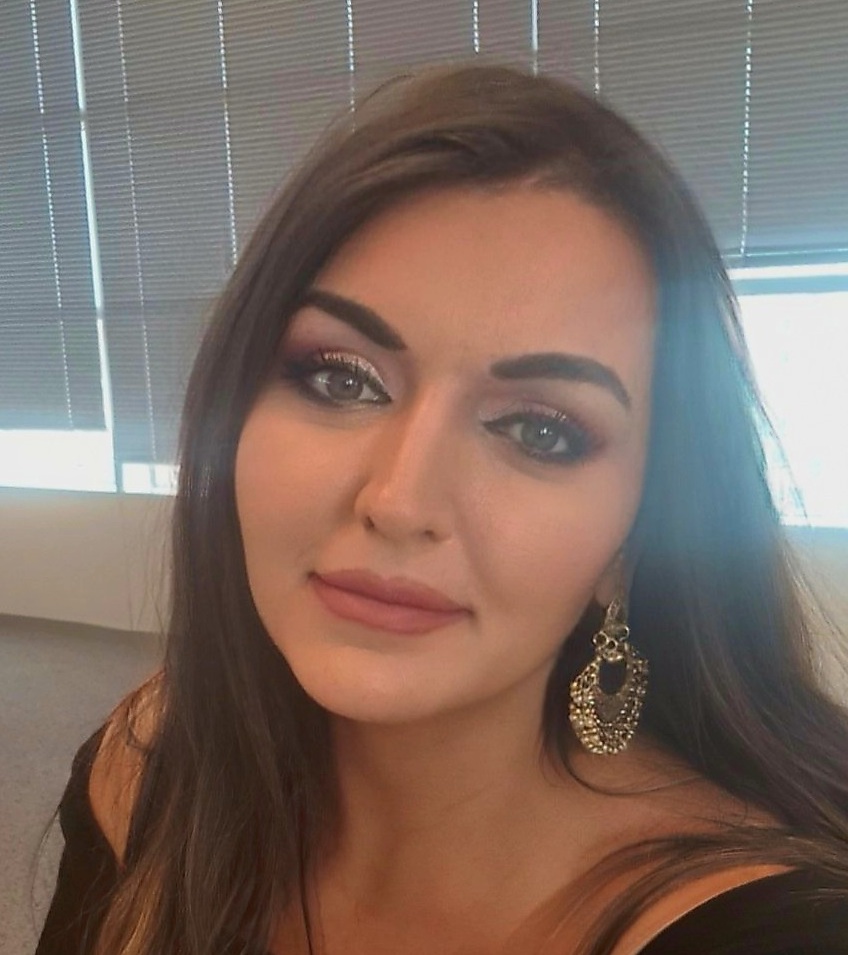
Keynote: What can we learn from the USA?
Jim Lee (Chief, IRS Criminal Investigation)
‘Unity makes strength’ is Jim Lee’s main message. He believes that a public-private setting is incredibly powerful in developing, maintaining, and strengthening relationships.
In his day-to-day operation Jim oversees a worldwide staff of 3400 people. Their (primary) mission is to investigate income tax violations, but they also investigate other financial crimes, like money laundering, bank secrecy, terrorist financing, ID theft, narcotics, and the list goes on. His department spends 100% of their time on financial crimes and the division can get involved in every money crime there is. Therefore, Jim thinks of his division more as protecting integrity and protecting the financial system overall. They partner every day with their domestic and international federal equivalents to unravel complex financial transactions.
Jim has been a law enforcement officer for twenty-eight years. Experience as a law enforcement professional tells him that there will always be fraudsters dreaming up a way to get money into the system. In his opinion, nothing has changed in financial crime in the past fifty years. Criminals are doing the same thing they did fifty years ago, but they are just using new tools and technology to be more efficient in what they are doing. The speed and convenience of money moving, the evolution of digital assets, aiding to create the anonymous nature and money laundering service evolving in a stand-alone enterprise, are some of the most striking evolutions Jim has seen throughout the years.
Furthermore, he sees two typologies. The first one is emerging, which does not necessarily mean that it’s new. It’s already here, but we know little about it. It’s play-to-earn (P2E) games. Play-to-earn games is a new generation of videogames where players can be paid in-game currency for simply playing the game. These earnings have in-game value, but you can also take it out of the game and then it has real world value. One can also purchase the currency to use in the game. These play-to-earn games usually involve NFTs. In these P2E games, one owns these NFTs. As with all new technological advancements, criminals find ways to misuse these. For example, criminals can use these P2E games in a money mule system. Most investigators lack the experience, the expertise, the tools and the ability to identify these types of transactions.
The second typology is that money laundering organisations are becoming more professional. So there are more stand-alone entities with professionals (like attorneys, accountants, lawyers and financial institutions) helping them. This promotes underground banking within industries, in which large amounts of cash are being moved internationally without triggering some type of financial reporting. Cash is still king, because it’s very hard to trace and follow the money trails. Technology advancements help try to mask these trails even more.
AML Specialists are the first line of defence, and they are usually the ones who see the suspicious activities. They sit on a lot of data and produce a lot of data and documentation in their day-to-day work. For Jim’s department this is really a great source for their investigations. His division’s successes have a few things in common: public-private partnerships woven into everything they do and continued investments in data and cyber. Technology is important to keep pace with the bad guys and we should also take advantage of the cyber and data advancements. Of course, this means that crime fighters need to be well trained in these new tools and technologies. His division has always valued public-private partnerships and they continue to put significant emphasis on it. That’s the reason Jim was happy to come to this event. His closing words were that in a globally enactive world, we can’t afford NOT to work in a public-private setting if we want to have an impact on those committing financial crimes. Global problems require global solutions. Unity makes strength.
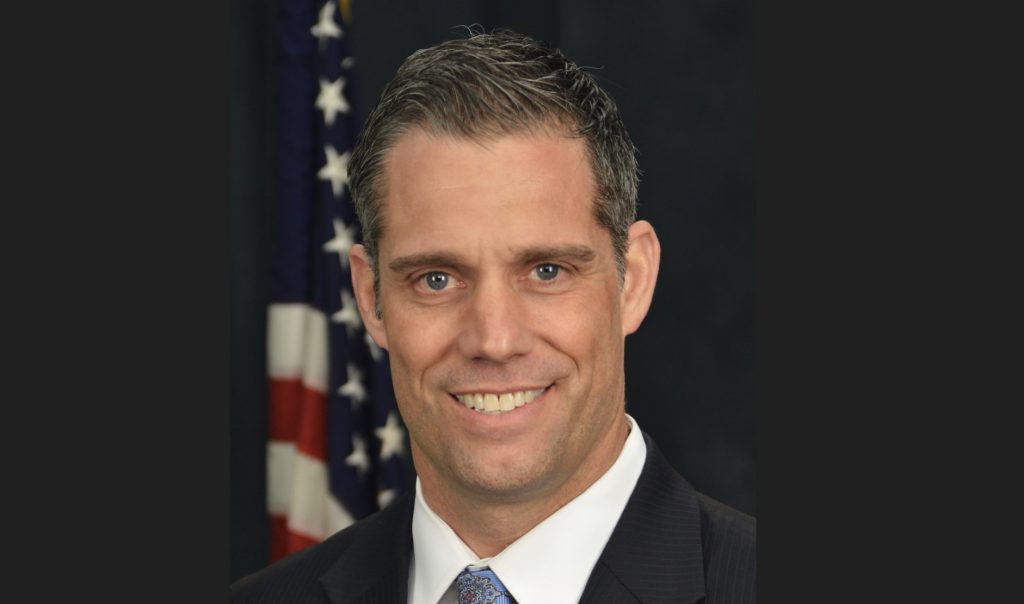
Panel I: Cash – hard to handle
Participants: Marc Kemper (Team Lead, Financial Economic Crime Squad), Sophie Cohen Tervaert (Head of the Payments Policy Department, DNB), Baldwin Kramer (Managing Partner Financial Advisory & FEC Specialist, Deloitte) & Eline Koster (Lead SIRA & RAS, Rabobank)
Cash is still an important topic within the AML domain, as criminals make use of it and it can be difficult to track that money trail. In risk-assessments for money laundering, cash is still way-up there as a risk. During this panel, the participants spoke about the experiences with cash in their field and what changes/rules they would like to see when it comes to cash. The key takeaways were:
- We can’t just stop using cash, as it is still one of the most important means of payment for a lot of people in the Netherlands. Most people who pay with cash these days, are people who are part of so-called vulnerable groups. These are people who are trying to make ends meet, they are using cash for budgeting reasons or they’re using cash because it’s easier for them (e.g. because they are visually impaired).
- Certain methods to limit the amount of cash could make it more difficult for criminals to launder money and could help crime fighters in their work. One example is to prohibit large denominations (500 and 200 euro bills). However, for banks it’s quite easy to detect these large bills. The weakest links in a criminal network use these bills. So, if these large bills are triggered, banks can (together with public parties and better rules in privacy) start to unravel a criminal network. The question arises whether criminals would go to a bank to deposit cash, in the first place.
- We have seen a decrease in the use of cash in the Netherlands, but it has stabilized after covid. Now it’s around 20%, which corresponds with research from DNB that one in five people prefer to pay in cash. Banks have a role not only in detecting large amounts of cash and large bills, but also in informing clients about cash and discouraging them in the excessive use of cash and/or large bills. This role of banks might have slightly aided in the decrease in the use of cash we have seen.
- Overall, it’s a balancing act. People who have good intentions should be able to use cash in a responsible way and have access to cash, because they need it in their daily life. For the trust in the financial system and from a monetary point of view, it is important to have a balance between private (money in the bank) and public (cash) money. On the other side of the scale, cash is seen as a potential threat and we want to see the inherent risk cash has mitigated and money laundering deteriorating.
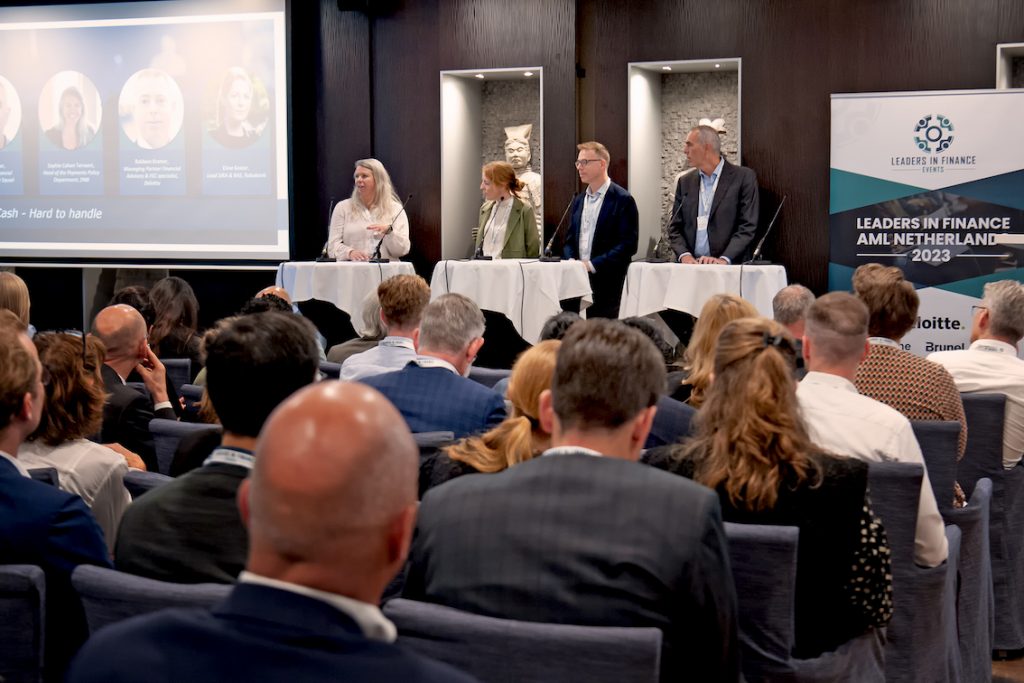
Research talk: The KYC analyst – neither front office nor compliance. How does he hold ground?
Tom Loonen (Professor Financial Law and Integrity, VU Amsterdam)
Together with dr. Evelyn Braumann, Tom Loonen conducted research on the KYC analyst. The goal was to acquire information on job satisfaction and operational challenges. Why is this study important? Well, without the KYC analyst AML policies will not be correctly implemented, existing and new clients will not be evaluated properly and AML efforts are without adequate effect.
The study consisted of a digital survey that was conducted during the summer of 2023. Six large and medium sized banks in the Netherlands participated and 650 analysts took part in the survey. The stereotype is that a KYC analyst doesn’t see purpose in the work he/she is doing. They are frustrated, bored and feel that their work has no impact. They do this job for the money, often temporarily (so job hopping) and on an independent basis. However, this stereotype turned out to be inaccurate.
As it turns out, more than 90% of the participants has a maximum of two employers as a KYC analyst. In the majority of the cases, they have a permanent contract. Looking at their educational background, a small percentage has only secondary school, 7.8% of the analysts have an MBO-diploma (secondary vocational education), almost 50% has a HBO degree (university of applied science) and the remainder has a university degree. Analysts feel that they have authority in their work. They feel recognized and determined. A lot of KYC analysts have client contact. KYC analysts of both larger and medium sized banks are quite satisfied about their job. Also, KYC analysts believe in the purpose of it.
A more in-depth analysis can be made. KYC analysts with a HBO and MBO background are more satisfied than people with an academic background or those who only have a secondary school education. University degree people and those with a lower education are less happy as KYC analyst; they feel more pressure, frustration and stress than the MBO and HBO analysts. Overall, KYC analysts don’t feel guilt when it comes to accepting or not accepting new clients. They see being compliant with regulations as the biggest factor in servicing customers. This could indicate that KYC processes are mechanical and autocratic. According to analysts, there are some challenges in their work. Examples of these are working together with compliance and the commercial front office in getting a client accepted, keeping up with all the regulations and legislations, the long processes on the job and hiring, training and retaining good staff.
Based on these results, some recommendations can be made. Focus more on attitude and proper communication skills. Focus on the MBO and HBO level, because of all the groups, they seem to be the most satisfied with doing this job for a longer period. Education and training is key in keeping up with legislation. Get clients more involved in the KYC process (maybe by gamification or rewards) in order to speed the process up and thus reduce some frustration and stress. Hire and retain qualified staff, in order to maintain good quality. In conclusion, the KYC analyst is doing quite well, but there are some challenges to be tackled. The VU wants to help with these challenges and various research is being conducted on this topic.
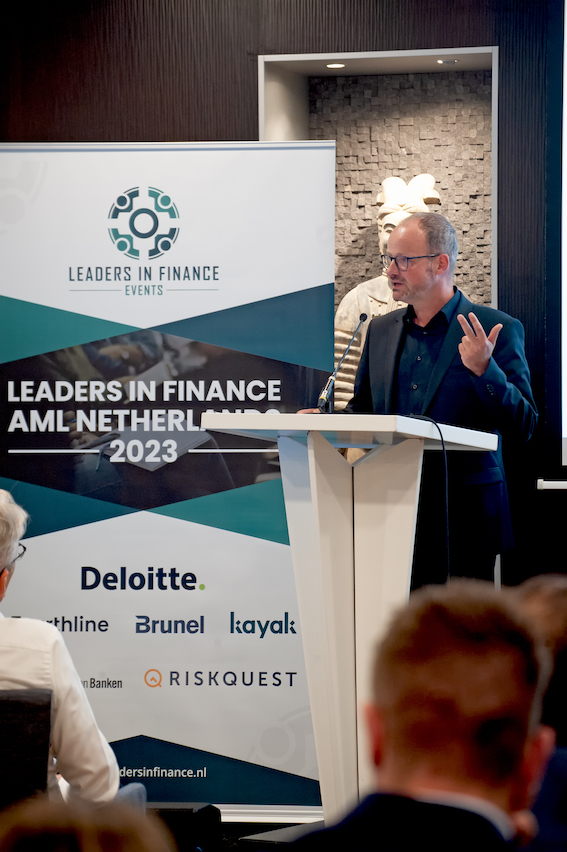
Panel II: Calibrating the risk-based approach
Participants: Jaap van der Molen (Head of Detecting Financial Crime, ABN AMRO), Karim Tadjer (Global KYC Lead, ING), Mark van Driel (Public Prosecutor, Netherlands Public Prosecution Service), Steffie Schwillens (Head of Department Financial Crime Supervision, DNB) & Robin de Jongh (Global Head of Client Due Diligence, Rabobank)
During this panel, the report ‘From balance to recovery’ (which was published in September 2022) was discussed. In line with this, the bunq case was also a topic of this panel. The key takeaways were:
- The DNB had three main messages with the report. From recovery to balance means from a technical compliance way of looking at KYC, to a real risk-based approach. So risk-management in this field. The reason why DNB wants it this way, is because we have a de-risking issue. There have been some side-effects from former approaches. Some groups of customers had difficulty getting into banking services and groups that feel that they don’t get the services that they need to fulfil a role in society. Lastly, the impact that innovation can have in the field and the use of modern technologies to make the work more efficient, is discussed in the report.
- About the ruling in the bunq case, the big banks agree that it’s not about winning or losing, but that the ruling has brought clarity. The judge in the Netherlands is the one in the end who says how to interpret the law. DNB agrees that it’s helpful when open norms are cleared up. The ruling is nuanced. The judge in essence said that DNB should not fill in too much how banks should do things, but to look at the outcome. The dialogue on the open norms is important, because together we will get more clarity about what good is good enough. The market also recognizes that this topic is important.
- Decades ago, banks ‘only’ had to passively comply with laws, but at a certain point in time they had to become active gatekeepers. They missed this and when they realised and understood that they had to go from a passive role to an active role, they did too little too late. In the entire economy in the Netherlands there was a catching up to do (e.g. with auditors). However, the banks feel there has been too much emphasis on them. In the past they might not have done enough, but in the last five years, banks have done a lot and are on top of their task. But they can’t do this alone and we should also take care of other parties to tackle the problems were facing in the Netherlands. All stakeholders should do their jobs to the best of their ability and work together. Otherwise, we will get drifted away in this discussion and the ‘real’ problems (e.g. youngsters being drug couriers) won’t be dealt with properly and KYC will be seen as a burden, which it shouldn’t be.
- Transaction Monitoring Nederland (TMNL) is still alive and receives the support of all the parties. It is a nice example of the public-private partnerships in the Netherlands, as rule makers, regulators and banks are brought together in this collaboration. However, TMNL is limited at the moment, because the legislation still isn’t there. The involved parties do believe that collaboration and information sharing is helpful in the fight against financial crime and they are hopeful that the rules on data protection and privacy in the near future won’t limit the sharing of data for them, so TMNL can do more. The added benefits are big.
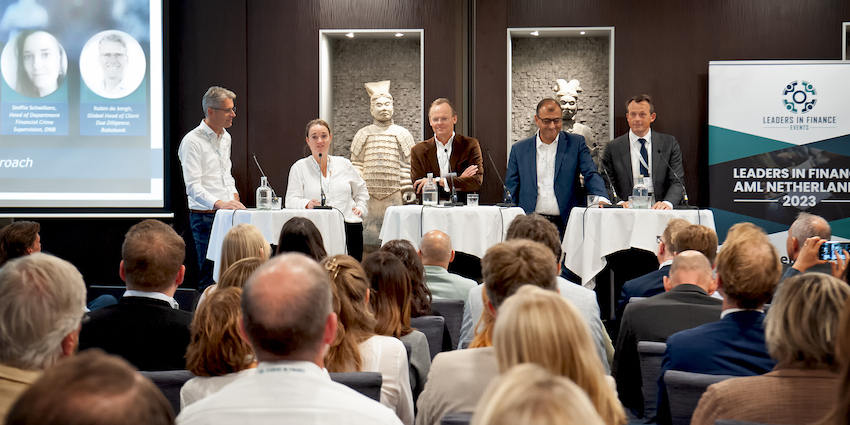
Panel III: Criminals generate new methods of money laundering daily, should we allow our AI to become generative as well?
Participants: Ali el Hassouni (PhD in AI, Head of Data, bunq), Hinda Haned (Professor of Data Science, University of Amsterdam), Rasmus Ingemann Tuffveson Jensen (Spar Nord Bank & PhD, Aarhus University) & Krik Gunning (CEO & Co-Founder, Fourthline)
This panel started off with a real-life case that happened recently at bunq. An employee of bunq received a deepfake video call from ‘Ali Niknam’ requesting a large amount of money. Bunq luckily has a failsafe for these situations. However, it turned out that it was quite easy to make this deepfake, using only a few clips (voice and image) of Ali Niknam. This shows the limitless possibilities that AI can have. The key takeaways were:
- Scams online are happening; deepfakes are sent to families. But this doesn’t happen on a very large scale, so we still have time to raise awareness and to educate the public about this. In schools, at work and in public debates, we should talk about the sharing of certain data and whether this is on a need to know basis or not. The public should be made aware of the harmful consequences of the sharing of certain data and that AI could be good or bad, depending on what data you feed it. In the discussion about AI, we should also talk about what role we want AI to play and values. Do we want AI to help in healthcare and in policing? Or just help with certain tasks or jobs? What are the things we definitely don’t want with AI? What should be regulated and what can we entrust to private companies when it comes to the use of AI? We’re at the beginning of the AI debate and there is still much to talk about.
- There are two sides when it comes to AI. AI can create opportunities, but it can also create problems. The debate is split between the ones that think AI will lead to the next industrial revolution and that we are all going to get rich from it and the ones that think we’re going to have a scenario from Terminator, or in a less grim way, jobs will be taken over by AI. While AI is seen as creating opportunities, the dangers have also to be considered. We must look at both sides of AI and at the end of the day, it all depends on who is behind the wheel and what the intentions of that person, organisation or society as a whole are. When it comes to the labour market, one should look at what AI can do better than humans and use that. There is a shortage in the labour market and there are people who are dulled out by doing a certain job. AI might be the solution for that and could eliminate tedious tasks and because of this, humans can do more meaningful tasks. Certain jobs or tasks may disappear, but that’s not new and we have seen that throughout history. It also creates new jobs and tasks at hand. The panel believes that the human element will stay important, at least in the near future.
- When it comes to AI in the AML field, bunq has had good experience with it. Bunq has worked for a long time with AI to know their customers. With the use of AI, their transaction monitoring became more scalable and accurate and because of this, their KYC analysts could spend more time on the actual cases and clients. For the larger banks, it might be difficult to get the same AI success as bunq, because they have a history and are not as young as bunq, thus making it difficult to separate the good data from the bad data. Nevertheless, the panel agrees that there is huge opportunity within AML for AI. By now there is more literature on applying AI in an AML setting than classical statistic rules and classical rule-based systems. That’s not because there is a lot of literature on AI in AML, it’s because there is very little on the rule-based systems. Because of the AI developments within AML, less people will be needed, but there will probably always be a human in the loop. And also within AML, awareness is important. Employees should be trained regarding GenAI.
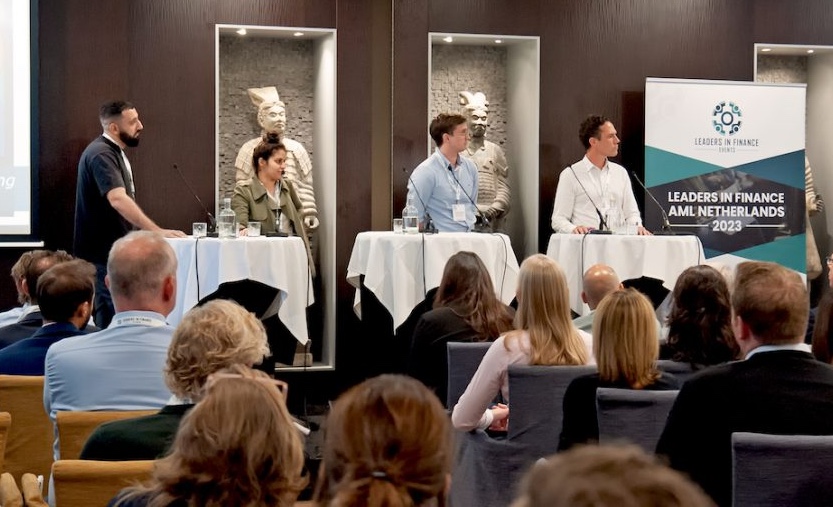
Keynote: Incorporating the Illicit
Nicholas Lord (Professor of Criminology, University of Manchester)
Nicholas Lord talked about a project of his that is really fresh. He and his research partners only recently finished with the data analysis and their article is under review. They collected data about the online market for shelf companies. This is quit an important topic in today’s scams. These shelf companies seem to play a role within the growing scene of financial romance scams, as they enable these scams.
Shelf companies are pre-registered limited companies with no business or trading activity, assets or liabilities, and they can be purchased online at various prices and with varying features by everyone interested in obtaining a company quickly in a preferred jurisdiction without having to go through the company formation themselves. These shelf companies (often also referred to as ready-made companies) refer them to an aged company that can be bought for a specified price. Shell companies refer to business entities with no significant assets or ongoing business. The issue is that there is now an emerging literature, analysing the role of these shelf and shell companies in the organisation of illicit financial flows. Scholars in academia of organised crime have drawn attention to how these networks and groups use these companies to launder fast amounts of the proceeds of crime, to generate income, to avoid personal liability, to legitimise other activities or to fund criminal activities.
Bad actors want to conceal their finances and try to exploit the law. They might do this by exploiting legal differences that exist across jurisdictions when it comes to tax laws. These companies might help. Shell companies provide an illusion of a legitimate business and effective anonymity, because the beneficial owners of these companies remain obscure. Such ownership structures have been evidenced to correspond with an increased likelihood of criminal activities, like money laundering. There are two different types of markets for these shell and shelf companies. There is a premium market for high net-worth individuals and that is quite difficult to access if you’re not part of the global elite. And then there is the economy end of the market, with a greater accessibility, enabled by online company formation agents and service providers. These services are provided to everyone, everywhere and they relatively don’t cost that much. These shelf companies are registered in varied jurisdictions and provide local management services in these jurisdictions as well, like the setting up of bank accounts for covert entities without proof of identity of the individual.
In his research, Nicholas focused on the online market supply of shelf companies. The main objective of the study was to understand this market supply behind the sale of shelf companies. For their research, they looked at 296 websites that advertise the sale of shelf companies.
The results show that suppliers for these websites are based all over the world, with the most common jurisdictions being the UK, US, Poland, Hong Kong and Germany. The most common used languages on the websites are English, Russian, Spanish, French, Polish and German. This also illustrates that these services are offered across the globe. It turns out that 75% of these online suppliers also offers company formation services. 80% of suppliers also offered after-sale management (like registered officers and mail forwarded). 32% offered the appointing of third-party individuals to act as shareholders or directors of the company that is created. These are based in the jurisdictions where you want to buy the company. 60% offered the possibility in opening a bank account in another jurisdiction as well.
51% of suppliers offered a price for shelf companies. That means that 49% didn’t offer a price on the site for the shelf companies and one needs to contact them in order to inquire about the price. On the websites with prices, the prices range from $35 to $8.5million for a single shelf company. Most prices range from a few hundred US dollars to around $2000. Of course, the price of shelf companies varies for a number of reasons. Around 88% of the shelf companies on sale, were incorporated after 2015.
The research also looked at the diversification of offered services (e.g. after-sale management, nominee services, bank accounts and providing company formation services). 5% offered only one service, 16% offered two services, 24% offered three services, 33% offered four services and 22% offered five services. So, 79% of the online suppliers offered three or more services. They also looked at how diversified suppliers are in relation to jurisdictions offered. On most websites, jurisdictions were mentioned. 65% offered shelf companies in a single jurisdiction, 19% offered between two and ten jurisdictions, 10% between eleven and fifty and 4% offered shelf companies for sale in 51 jurisdiction. The top jurisdictions with the most activity are the UK, US, Hong Kong, Belize, Cyprus and Poland. This highlights again the global nature of the online supply of shelf companies. The last objective the research focused on, was the interconnection of suppliers. It turns out that the 296 online suppliers can be broken down into twenty discrete networks.
This research sheds light on the globalised nature of the online shelf company market, in terms of supply and demand.
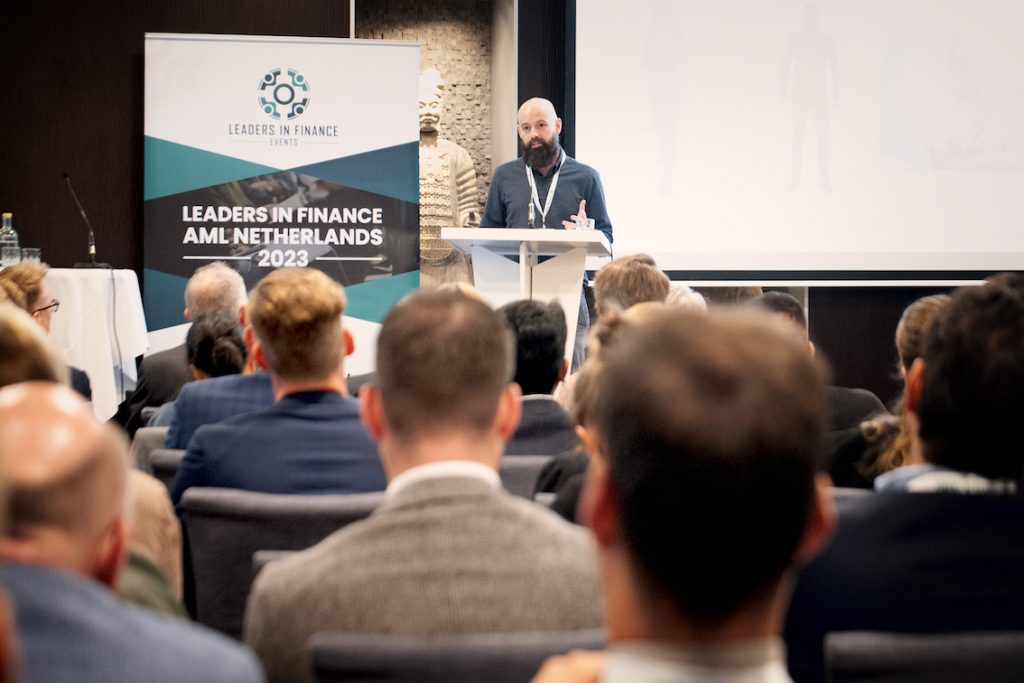
For information on the next edition, see here: https://www.leadersinfinance.nl/aml-europe-2024/

